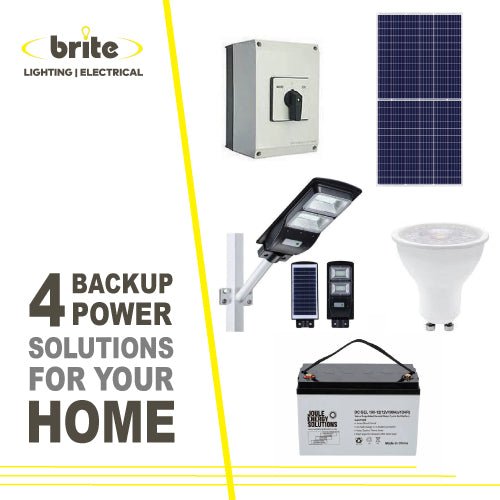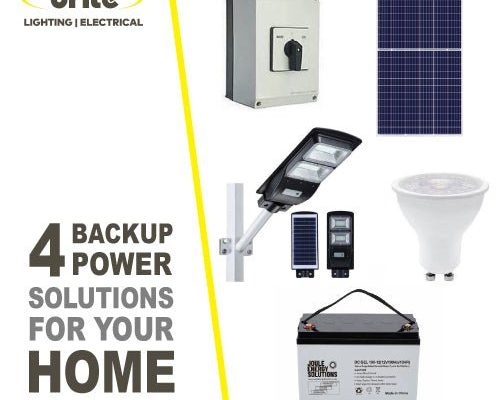
Imagine you’re sitting with a friend at a café, and the topic of backup power comes up. You might say, “It’s like having a safety net that catches you when you fall.” Whether you’re considering a portable generator, a home battery system, or a whole-house generator, each option has its pros and cons. Let’s dive into some of the top backup power solutions available for homes in your area.
1. Portable Generators: The Versatile Choice
Portable generators are like the Swiss Army knife of backup power. They’re versatile, easy to use, and great for various situations. You can bring them on camping trips, use them for outdoor parties, or rely on them during a power outage. One of the main perks is their mobility — you can easily move them around your home or take them with you.
However, keep in mind that portable generators run on gasoline or propane, which means you’ll need to store fuel safely. When the power goes out, you’ll want to make sure your generator is ready to go. Knowing how to set it up quickly can be a game changer. It’s also worth noting that portable generators can be a bit noisy, so if you have close neighbors, that’s something to consider.
2. Home Battery Systems: Sustainable and Efficient
Home battery systems, like the Tesla Powerwall or LG Chem, are becoming increasingly popular. These systems store energy from the grid or solar panels, so when the lights go out, you have a reliable power source. Picture it like a giant battery pack for your home, keeping everything running smoothly.
The best part about home battery systems is that they can be integrated with solar energy. If you have solar panels, your battery can store excess energy produced during the day for use at night or during outages. This setup is not only efficient but also eco-friendly. However, the initial investment can be higher than other options, which is a common concern for many homeowners.
How Do Home Battery Systems Work?
Home battery systems work by storing energy for later use. When your home needs power, the system releases electricity, ensuring your essential appliances keep functioning. This can be particularly valuable during prolonged outages, offering a seamless transition from grid power to battery power.
3. Whole-House Generators: For Total Peace of Mind
For those who want complete peace of mind, a whole-house generator might be the answer. These systems are permanently installed and can power your entire home during an outage. Think of it as a guardian that stands watch, ensuring you’re never left in the dark.
A key benefit is their automatic transfer switch, which means they kick in without you having to lift a finger. If the power goes out, the generator senses the loss and starts up, all while you’re still sipping your coffee. However, these systems can be more expensive to install and maintain, which is an important factor to consider when budgeting for backup power.
4. Inverter Generators: Quiet and Efficient
If noise is a concern for you (say, in a suburban neighborhood), inverter generators are a fantastic option. They operate quietly, making them ideal for nighttime use or areas with noise ordinances. These generators produce clean electricity, which is crucial for sensitive electronics like computers and TVs.
Inverter generators can be a bit pricier than traditional generators, but their fuel efficiency and quieter operation often make them well worth the investment. Plus, many models are lightweight and portable, giving you flexibility and power whenever you need it.
5. Battery Backup Systems for Critical Appliances
If you’re looking to power specific appliances like your fridge or medical equipment, consider a battery backup system designed for that purpose. These systems can be smaller and more focused, keeping only the essentials running during an outage.
Imagine it as a well-planned emergency kit, ensuring that your most critical items stay powered while you wait for the main power to be restored. It’s a smart way to ensure that you don’t lose important food or medical supplies during a blackout.
Choosing the Right Backup Power Solution
When considering your options, it’s crucial to think about your specific needs. What’s your budget? How much power do you need? Are you looking for portability, or do you want something permanent? All of these questions will help narrow down your choices effectively.
6. Maintaining Your Backup Power Setup
No matter which backup power solution you choose, maintenance is key. Regularly check your generators, batteries, and any associated equipment. Keep fuel fresh in your generators and test them periodically to ensure they’re in working order when you need them.
If you opt for a whole-house generator, schedule routine check-ups with a professional technician. It’s like going to the doctor for a check-up — a little prevention goes a long way in ensuring your system functions correctly.
7. Where to Buy Backup Power Solutions in 96804
Finding the right backup power solution in your area can be as simple as a quick search or a visit to your local home improvement store. Stores like Home Depot or Lowe’s often carry a range of generators and battery systems. You can also check out specialized retailers or online platforms for more options.
Before buying, it might be helpful to read reviews or ask friends and neighbors about their experiences. You want something reliable, after all, and getting insights from others can guide your choice.
As we’ve explored, there are various backup power solutions for homes in zip code 96804, each with its unique advantages and considerations. Whether you choose a portable generator, a home battery system, or a whole-house generator, having a plan in place is crucial for keeping your home powered during outages.
So, take some time to assess your needs, budget, and lifestyle. After all, when the power goes out, you don’t want to be left sitting in the dark, wondering what to do next. Invest in a backup power solution that gives you peace of mind, and rest easy knowing you’re prepared for whatever life throws your way.
